Diarrhea After Switching Formula
52 hours of research 6 minute read

Infant Diarrhea is a common occurrence in babies and can be caused by a variety of factors. A diet or formula change, for example, can cause diarrhea. Babies with cow's milk allergy (CMA) may experience diarrhea after switching to a soy formula.
From the outset, babies will be fed breast milk. But sometimes, it is not possible for mothers to feed their babies because of various problems. In this case, you can give them formula milk. Switched to different formula brands in the process of raising your children? Wondering if they are compatible with each other? We will give you the answer right now!
How Long Should A Baby Have Diarrhea After Switching Formula?
Some babies simply find many formulas more difficult to digest, though this is uncommon. It may take them some time to adjust to a new formula. This can result in stomach cramps, gas, and diarrhea.
The majority of causes of newborn diarrhea do not require treatment. You can keep your baby comfortable and hydrated at home until the diarrhea subsides. In rare cases, diarrhea may persist for longer than usual. If your baby has severe diarrhea or diarrhea that does not improve within 24 hours, contact your pediatrician.
Diarrhea After Switching From Breastmilk To Formula
This is commonly caused by your baby's stomach readjusting to its new diet, and is generally nothing to be too alarmed about. It may take some time for a baby's stomach to transition from digesting breast milk or formula to dealing with new, solid foods. This can cause diarrhea until the digestive hiccups subside.
How long does a baby take to transition from breastmilk to formula? Allow yourself two to three weeks, if possible, to transition from breastfeeding to formula, and begin by substituting a bottle feeding for one breastfeeding session—ideally, the one your baby will miss the least.
Is Diarrhea Caused by Switching Formulas?
Diarrhea can also occur when they're changing formulas. A sudden change in diet, like switching from breastfeeding to formula or vice versa, can cause your baby's digestive system to react negatively. The same thing happens if you suddenly switch them from one type of formula to another or introduce solid foods too soon. Diarrhea is often just a reaction—the body's way of telling you that something has changed and it needs more time to get used to the new situation.
If your baby is breastfed and develops diarrhea after starting on solid foods, it could be due to an allergy (or intolerance) to cow's milk proteins found in many infant formulas and other solid foods such as cereals and desserts made with cow's milk products.
Formula Allergy Is The Most Common Cause Of Diarrhea In Formula-Fed Babies
It is possible that your baby is allergic to the formula you're using. If so, his symptoms will appear suddenly. He may have a rash and be vomiting or have diarrhea as well.
If your baby develops any of these symptoms after starting on a new brand of formula, stop giving it to him immediately and contact his doctor immediately.
The best way to avoid allergic reactions is by taking caution when changing brands and do not introduce more than one new substance at once (like introducing a new food or changing the type of diapers).
However, be sure to give your baby ample time to adjust to a new formula - a typical formula transition can take up to three weeks when introduced properly.
Diarrhea In Formula-Fed Babies Can Also Be Caused By Viruses
Diarrhea in formula-fed babies can also be caused by viruses. This most often happens when babies are around other children and adults who may have picked up a stomach virus from food or from contact with another sick person. Hand washing and good hygiene go a long way in preventing these types of illnesses.
As your baby gets older, he or she will get used to the taste of formula, so you won't need to mix it with anything else. You can start by mixing half formula with half water until your baby adjusts to the new taste, then gradually add more water until you're using only water (this usually takes about two weeks).
Stool Types For Babies
Baby poop that is yellow and seedy:
|
This stool is perfectly normal. The poop of breastfed babies has a mild odor (and might come with loud sound effects). |
Baby poop that is tan and thick:
|
The stools of your baby are normal. Only be concerned if your baby's poop becomes watery or hard. |
Watery, brown, and loose baby poop that is unusual for your baby:
|
The occasional loose baby stool is nothing to be concerned about. However, if it occurs on a regular basis for two days or more, it could be diarrhea. Diarrhea in babies can cause dehydration and may be an indication of infection. These infections are usually not dangerous, but the dehydration that can occur is a concern. |
Baby poop that is dry, brown, and hard:
|
Constipation is normal, especially in formula-fed babies and when your baby begins to eat solid foods. It could indicate that your baby is not getting enough fluid or that he is losing too much fluid due to heat, illness, or fever. When hard stools cause tiny tears in the soft tissues surrounding the anus, blood streaking on the surface of the stool can occur. |
Treatments For Baby Diarrhea

Diarrhea usually clears up on its own within a few days. If diarrhea lasts more than a week and is accompanied by other symptoms, you should call your doctor. If it's only mild or moderate, you can take steps to manage your symptoms at home and help your baby feel better faster:
- Offer plenty of fluids (water, juice, or breastmilk) every hour while awake if your baby is older than 6 months old.
- Breastfeed often if possible and offer formula as directed by the doctor or nurse practitioner when breastfeeding is not possible. Feeding too much may cause additional discomfort for your child; so use smaller amounts more frequently rather than larger amounts less frequently until diarrhea improves.
- Avoid solid foods until the diarrheal stool pattern is back to normal for 24 hours unless otherwise directed by medical personnel because solid foods may irritate an inflamed colon or rectum (the end portion of the large intestine).
Advantages and Disadvantages of Switching Formula
| Advantage | Disadvantage |
|---|---|
|
The formula has a lower lactose level and is, therefore, easier on your baby's tummy. |
Your baby may have diarrhea when switching from one type of formula to another, but this should only last a few days or so, depending on how quickly her body adjusts to the change in diet. |
|
It contains the same amount of iron as the regular formula. This means your baby will continue to get all the nutrients that she needs for healthy growth. |
If diarrhea persists longer than this, contact your pediatrician because she may need to be seen at an urgent care facility or hospital if there are any other symptoms present with her diarrhea (such as vomiting). |
HiPP Organic Milk (Gentle Formulas Only)
Having a baby is hard enough without having to worry about what goes into her formula. HiPP Organic Milk is a German brand of formula milk. It's made from organic ingredients, and it's a good alternative to breast milk. HiPP Organic Milk is also a good alternative to other brands of formula milk. Our HiPP Combiotic® contains dietary fibers (galacto-oligosaccharides derived from lactose, for example), which loosen and soften the stool. HiPP organic baby formula can provide the nourishment your baby needs while also being gentle on her stomach. HiPP infant formulas are certified organic, which means they're free of harmful chemicals and ingredients that get in the way of your baby's nutrition. With so many options available in the market today, it can be confusing to decide which is best for you and your little one. That's why we've created this guide to help you understand how HiPP products can help your family thrive
✓ Contains Probiotics & Prebiotics
✓ No sugar, no corn syrup, no soy
✓ No starch
✓ HiPP's most popular formula for newborns
Check PriceHiPP Dutch formula stage 1, stage 2, and stage 3 contain prebiotics known as galacto-oligosaccharides and probiotics known as L. fermentum hereditum® is made from organic lactic acid cultures and lactose that is similar to breast milk. Giving your baby HiPP dutch formula means giving him or her a strong immune system and a healthy gut microbiome. Furthermore, this infant food contains omega-3 and omega-6 fatty acids, which are important for your baby's eyes, brain, and nervous system.
✓ Age: Suitable from birth onwards
✓ Contains Probiotics & Prebiotics
✓ No sugar, no corn syrup, no soy
✓ Reduced lactose with hydrolyzed milk protein
✓ Easy to digest formula for sensitive babies
Check PriceThis gentle formula features both prebiotics and probiotics in the form of GOS fibers and organic lactic acid cultures, respectively. Both pre and probiotics promote softer stools, reduce issues like gas, colic, or bloating, strengthen immunity, and promote digestive health.
Holle Organic Milk (Gentle Formulas Only)
If you're looking for a good alternative to breastfeeding and your baby is having trouble digesting regular formula, Holle Organic Milk is a great choice. This formula is made from organic milk and contains no additives or preservatives. It's also ideal for babies with allergies or lactose intolerance because it doesn't contain any soy lecithin, which is often used in commercial formulas to bind ingredients together.
✓ Age: 0-6 months
✓ No palm oil
✓ Contains natural whey, DHA, & ALA
✓ Demeter certified (Organic++)
Check PriceThis formula is recommended by European pediatricians as the first choice of milk for babies who have difficulty digesting other milk, as well as an easy-to-digest option for sensitive stomachs due to colic or allergy issues. Holle Goat formula comes with four stages, Stage PRE, Stage 1, Stage 2 and Stage 3.
✓ Clean formula ingredients
✓ Demeter biodynamic certified
✓ Contains natural whey, DHA, & ALA
✓ Holle's most popular cow formula
Check PriceThis formula comes rich in vitamins and minerals to support natural infant growth. With a short ingredient list devoid of complicated jargon or chemicals, Holle is the most secure option. It also has Maltodextrin for fuller tummies, no added prebiotics/probiotics, biodynamic and Demeter organic certified
Holle Cow has multiple stages, Holle Stage PRE, Stage 1, Stage 2, Stage 3 and Stage 4.
Lebenswert Organic Milk
✓ Bioland certified (Organic++)
✓ No sugar, no corn syrup, no soy
✓ DHA & ALA for brain development
✓ Popular for babies with stomach trouble and constipation
Check PriceLebenswert, established by Holle, offers a close resemblance to natural breast milk, providing clean, simple, and organic ingredients in their formulas. Achieving Bioland certification, Lebenswert Stage 1, Stage 2, and Stage 3 ensures the use of 100% organic cow's skim milk from biodynamic pastures, where cows graze freely in fields free of pesticides, fertilizers, hormones, and antibiotics. Instead of corn syrup or synthetic sugar additions, organic lactose from cow's milk serves as the primary source of carbohydrates in this organic formula. While eliminating harmful artificial additives, Lebenswert makes sure that your baby gets all the vitamins and minerals needed for early-stage growth and development.
Kendamil Organic Milk
✓ Whole Milk as a Natural Mammal Fat Source
✓ Contains Plant-Based DHA and ARA
✓ No sugar, no corn syrup, no soy, no palm oil
✓ EU and British Soil Association Certified Organic
Check PriceKendamil Organic stands out as one of the most sought-after and highly acclaimed organic infant formulas, proudly originating from a family-run operation in the United Kingdom. Crafted with care, this formula uses EU-certified organic cow's whole milk sourced from Red Tractor-accredited farms as its wholesome base. With its commitment to quality and oversight, Kendamil works closely with British dairy farmers to ensure the finest and healthiest ingredients are packed into their passionately crafted organic formulas, available in three stages to meet your baby's evolving needs. Dedicated to mimicking natural breast milk, Kendamil uses full cream cow's milk and incorporates a natural fat source Milk Fat Globule Membrane (MFGM) for cognitive development. This formula comes with three stages, Stage 1, Stage 2, and Stage 3.
When To Seek Medical Attention For Baby's Diarrhea?
- Your baby becomes lethargic or unresponsive.
- If they have blood in their stools.
- They become dehydrated (look for a dry mouth and less frequent urination).
- Has a fever over 104 F (40 C) for more than 12 hours.
Newborn Diarrhea
As you can see, there are many reasons to consider switching the formula your baby drinks. Some of these reasons may seem obvious and some may not. But the fact remains that by taking advantage of the advancements in formula technology over time, you’ll be giving your little one everything he needs for a healthy start in life! We hope this article has helped you decide if making a change is right for you and your family.
Best Formulas For Infant Diarrhea
Organic Life Start is committed to providing accurate, reliable, and trustworthy information to parents and caregivers. We carefully choose credible sources and follow a meticulous fact-checking process to uphold the highest standards in infant nutrition and parenting advice. To learn more about our dedication to accuracy, please explore our editorial guidelines.
Link To Sources


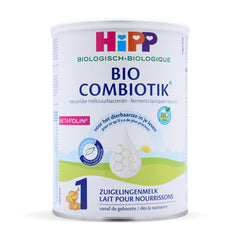
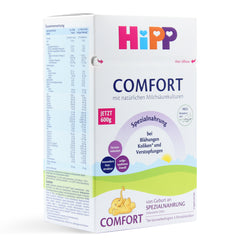
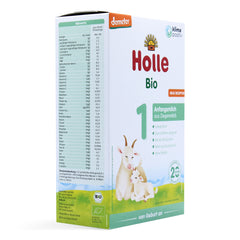
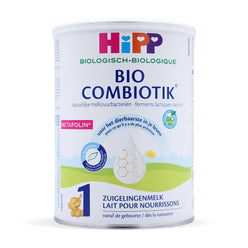

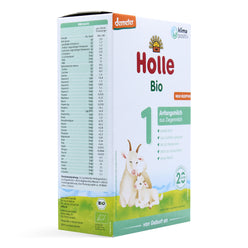
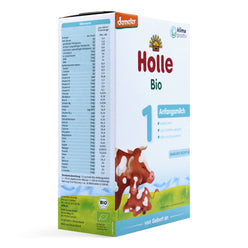
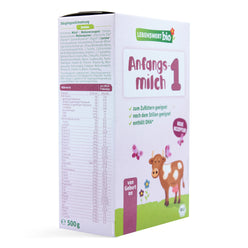
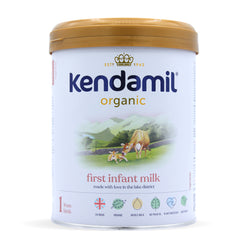
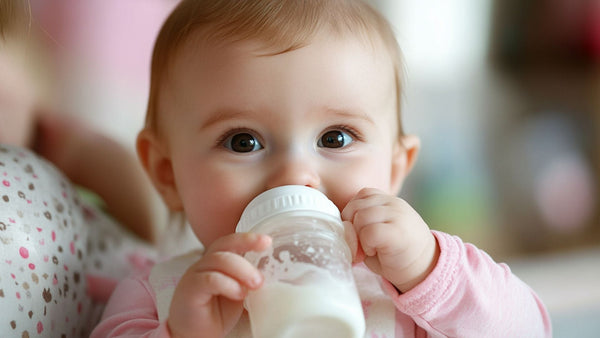





Natalie -
When my son Vicente began experiencing severe diarrhea, I realized I had to take action. It was difficult to ignore his obvious misery and discomfort after each meal. I decided to alter his formula after consulting with our pediatrician and doing much research. Trying out HiPP Dutch at that moment was a decision I was happy with. After drinking a few liters, Vicente appeared calmer and more collected. When his diarrhea stopped and his gastrointestinal problem improved, he felt an overwhelming sense of relief. As feeding time returned to its usual, peaceful pattern, I noticed that he was thoroughly enjoying his food. I applaud HiPP Dutch for its commitment to using only safe, high-quality materials in its products. As I watched Vicente improve and smile after each feeding, I knew we had made the correct decision. A baby’s health can be greatly affected by the formula that is chosen.
Allie Shuman -
January 19, 2026
I always worry about how switching baby formulas might cause diarrhea or upset stomach and whether it’s a sign of something serious. It can be so stressful trying to figure out if it’s normal adjustment or a reaction to an ingredient. I find myself second‑guessing every choice and wondering if I should switch back or try something else. Does anyone else feel the same way?
Rolando P. -
January 18, 2026
Since Similac seemed trustworthy and familiar at first, we did our best to make it work. When Markie started acting like she had an allergy and then had diarrhea, my spirits plummeted, and I knew something was wrong. Seeing him in pain after every meal was heartbreaking and made me rethink my approach. I did a lot of thinking and researching before deciding to try Kendamil Organic. After making the change—which was terrifying at first—we noticed an immediate improvement in Markie’s bottle handling. His tummy settled, the diarrhea eased, and he seemed so much more relaxed afterward. We really did feel like a weight had been taken off our shoulders. One small choice can make a big difference for the better. In hindsight, Markie needed to switch to Kendamil Organic to feel like himself again.